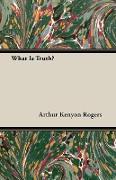- Start
- What Is Truth?
What Is Truth?
Angebote / Angebote:
WHAT IS TRUTH AN ESSAY IN THE THEORY OF KNOWLEDGE BY ARTHUR KENYON ROGERS NEW HAVEN YALE UNIVERSITY PRESS LONDON HUMPHREY MILFORD - OXFORD UNIVERSITY PRESS MDCCCCXXIII CONTENTS Belief and the Criterion of tfruth 1 Nature of Certainty 29 Definition of tfruth or tfrueness 55 Knowledge of Other Selves and of the Past 87 Some Competing theories 100 Relations 128 Some Metaphysical Implications 159 PREFACE IN a volume published not long ago and entitled Essays in Critical Realism a volume due to the collaboration of several writers there was pre sented to the philosophical world a somewhat new analysis of the cognitive experience, centering about a conception to which, following Mr. Santayanas terminology, the name of essence was applied. Critics generally seem to have found the conception a difficult one, not wholly through their own fault. It was the intention of the writers to recommend primarily a certain empirical description of the knowing experience and having called attention, in terms of what knowledge actually means to the knower, to one aspect in particular that had, as they thought, commonly been overlooked or misinter preted, they preferred to leave the matter here, especially since they were by no means in agreement about the next step. Their critics for the most part have asked for something further, and in the absence of any explicit account of the more ultimate philo sophical status of the essence they have, perhaps naturally, found the whole doctrine obscure. The main object of the present volume is to make an attempt to supply this lack. Unfortunately the writer has no reason to suppose that the particular interpretation here offered would find favor with his former colleagues. xii PREFACE I have, though with numerous changes, made use in the following pages of several articles already published in the Philosophical Review and the Journal of Philosophy. BELIEF AND THE CRITERION OF TRUTH I SHOULD like to be able to start off the inquiry on which I am embarking with a preliminary statement so simple and self-evident that it could be accepted by everyone. But since this is not to be expected in philosophy, I shall do the next best thing I shall take what is to me the simplest and most obvious proposition I can hit upon. My pre liminary definition accordingly will be this Truth for me is what I cannot help believing. To make clear what I understand by this will perhaps take a little explaining. I say that this proposition appears to me almost in the nature of a truism so far as it goes. Certainly that which I do not believe I cannot in any intel ligible sense call true this would be to empty terms of all accepted meaning. And indeed everything that I really do believe must for the moment come under the head of what I call the true. But the words can not help believing are intended to limit the field somewhat for we are engaged on a philosophical inquiry, and what we are after in the end is not any thing that may seem true, but what approves itself as true to the persistent inquirer. If we simply be lieved things, the problem of truth would not yet have arisen. It is because we discover that a number 2 WHAT IS TRUTH of things we have believed do not retain our belief, but turn out false or doubtful, that we set out to hunt for some standard truth which is really true. My statement in the first place is intended to pre suppose this situation, and to identify real as dis tinct from mere temporary and apparent truth with what we persist in believing after doubt and in quiry that from which we find ourselves unable to get away no matter what the sceptical temptation. For now suppose I find myself genuinely able to doubt a pretended truth not simply to think of myself in imagination as doubting it under different circumstances can the thing still belong to the cate gory of the true Evidently not it belongs to the doubtfully true, or that about which I am in doubt whether it is true...
Folgt in ca. 10 Arbeitstagen
